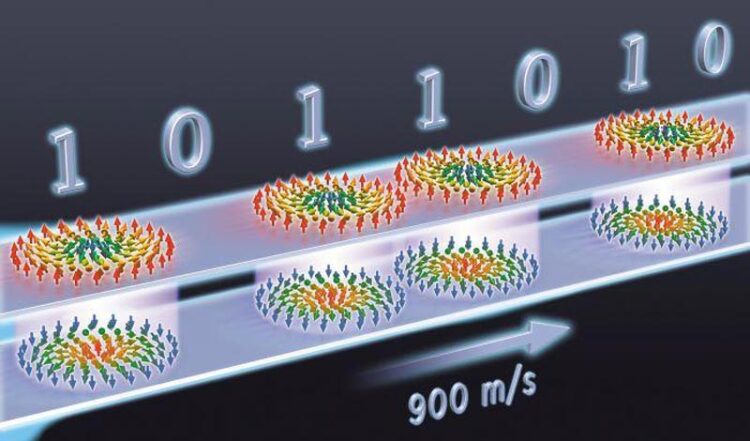Skyrmions move at record speeds

Antiferromagnetic skyrmions moved in a magnetic racetrack by an electrical current.
Credit: © Bruno Bourgeois and Olivier Boulle
… a step towards the computing of the future.
An international research team led by scientists from the CNRS1 has discovered that the magnetic nanobubbles2 known as skyrmions can be moved by electrical currents, attaining record speeds up to 900 m/s.
Anticipated as future bits in computer memory, these nanobubbles offer enhanced avenues for information processing in electronic devices. Their tiny size3 provides great computing and information storage capacity, as well as low energy consumption.
Until now, these nanobubbles moved no faster than 100 m/s, which is too slow for computing applications. However, thanks to the use of an antiferromagnetic material4 as medium, the scientists successfully had the skyrmions move 10 times faster than previously observed.
These results, which were published in Science on 19 March, offer new prospects for developing higher-performance and less energy-intensive computing devices.
This study is part of the SPIN national research programme5 launched on 29 January, which supports innovative research in spintronics, with a view to helping develop a more agile and enduring digital world.
notes :
1 – The French laboratories involved are SPINTEC (CEA/CNRS/Université Grenoble Alpes), the Institut Néel (CNRS), and the Charles Coulomb Laboratory (CNRS/Université de Montpellier).
2 – A skyrmion consists of elementary nanomagnets (“spins”) that wind to form a highly stable spiral structure, like a tight knot.
3 – The size of a skyrmion can reach a few nanometres, which is to say approximately a dozen atoms.
4 – Antiferromagnetic stacks consist of two nano-sized ferromagnetic layers (such as cobalt) separated by a think non-magnetic layer, with opposite magnetisation.
5 – The SPIN priority research programme and equipment (PEPR) is an exploratory programme in connection with the France 2030 investment plan.
Journal: Science
Article Title: Fast current induced skyrmion motion in synthetic antiferromagnets without skyrmion Hall effect
Article Publication Date: 19-Apr-2024
All latest news from the category: Information Technology
Here you can find a summary of innovations in the fields of information and data processing and up-to-date developments on IT equipment and hardware.
This area covers topics such as IT services, IT architectures, IT management and telecommunications.
Newest articles
Faster, more energy-efficient way to manufacture an industrially important chemical
Zirconium combined with silicon nitride enhances the conversion of propane — present in natural gas — needed to create in-demand plastic, polypropylene. Polypropylene is a common type of plastic found…

Energy planning in Ghana as a role model for the world
Improving the resilience of energy systems in the Global South. What criteria should we use to better plan for resilient energy systems? How do socio-economic, technical and climate change related…

Artificial blood vessels could improve heart bypass outcomes
Artificial blood vessels could improve heart bypass outcomes. 3D-printed blood vessels, which closely mimic the properties of human veins, could transform the treatment of cardiovascular diseases. Strong, flexible, gel-like tubes…





















